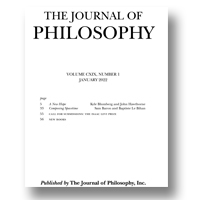|
1.
|
The Journal of Philosophy:
Volume >
120 >
Issue: 3
Martin A. Lipman
Standpoints: A Study of a Metaphysical Picture
abstract |
view |
rights & permissions
| cited by
There is a type of metaphysical picture that surfaces in a range of philosophical discussions, is of intrinsic interest, and yet remains ill-understood. According to this picture, the world contains a range of standpoints relative to which different facts obtain. Any true representation of the world cannot but adopt a particular standpoint. The aim of this paper is to propose a regimentation of a metaphysics that underwrites this picture. Key components are a factive notion of metaphysical relativity, a deflationary notion of adopting standpoints, and two kinds of valid inference, one that allows one to abandon standpoints and one that does not. To better understand how theories formulated in terms of this framework are situated in dialectical space, I sketch a theory in the philosophy of time that admits both temporal and atemporal standpoints.
|
|
|
2.
|
The Journal of Philosophy:
Volume >
120 >
Issue: 3
Finnur Dellsén, Insa Lawler, James Norton
Would Disagreement Undermine Progress?
abstract |
view |
rights & permissions
| cited by
In recent years, several philosophers have argued that their discipline makes no progress (or not enough in comparison to the “hard sciences”). A key argument for this pessimistic position appeals to the purported fact that philosophers widely and systematically disagree on most major philosophical issues. In this paper, we take a step back from the debate about progress in philosophy specifically and consider the general question: How (if at all) would disagreement within a discipline undermine that discipline’s progress? We reject two arguments from disagreement to a lack of progress, and spell out two accounts of progress on which progress is compatible with disagreements that persist or increase over time. However, we also argue that disagreement can undermine our ability to tell which developments are progressive (and to what degree). So, while disagreement can indeed be a threat to progress, the precise nature of the threat has not been appreciated.
|
|
